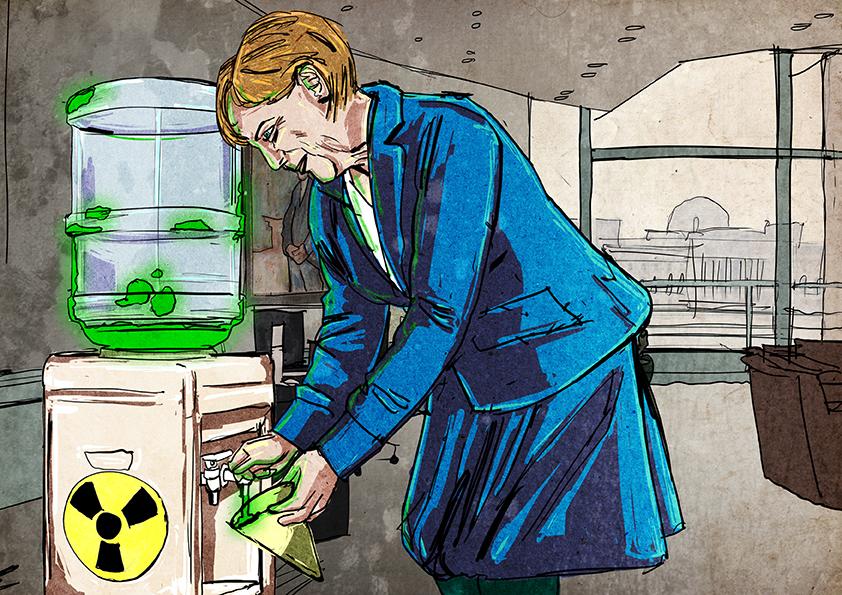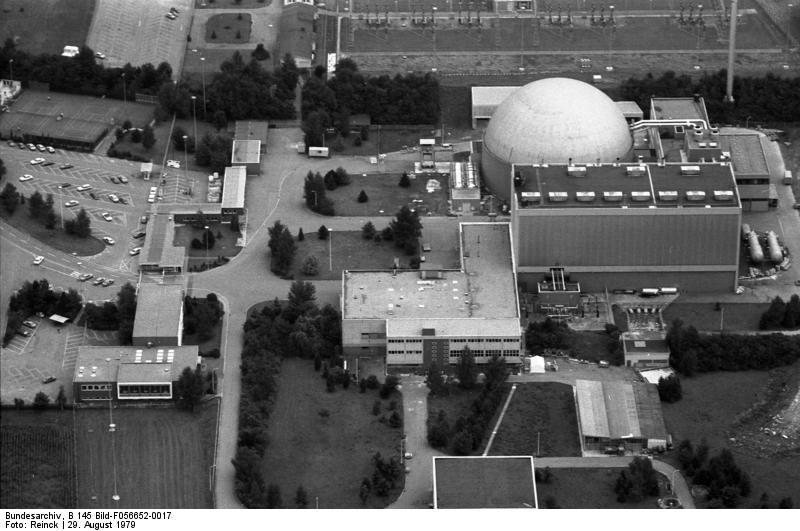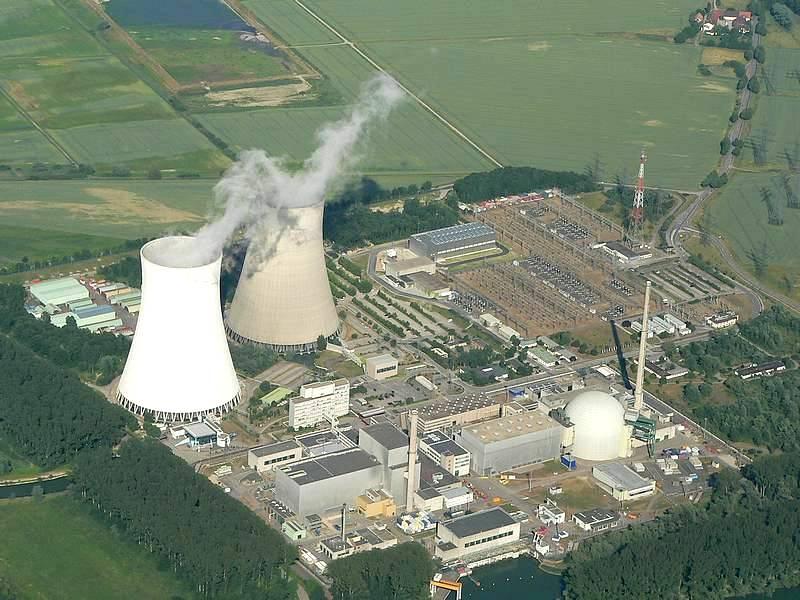Phase out!

Germany’s decision to phase out
the use of nuclear energy in 2000 was an important milestone for the anti-nuclear movement in that country. The movement started at the beginning of the 1970s and has been significantly active since then. After the Chernobyl incident of 1986, the German public became especially interested in the risks associated with the production of nuclear energy. This concern grew throughout the years, and resulted in the election of a coalition government in 1998 which included the anti-nuclear Green Party, Alliance ‘90/The Greens. Although the Green Party mustered only 6.7% of the total votes, it was able to have considerable influence and to achieve its long-sought goal of instituting a nuclear exit law.
Jürgen Trittin, the Minister of the Environment, Nature Conservation and Nuclear Safety at the time, negotiated with energy companies and agreed to limit the lifespan of nuclear power plants to 32 years. Based on this arrangement, each of the country’s nineteen nuclear facilities would end up producing a set amount of energy before closing down, and by the early 2020s Germany would cease to have electricity generating atomic reactors. This agreement, reached in 2000, was followed shortly afterwards by a national law in 2002.
Even though the phase out began soon after the laws were enacted, some factions of the anti-nuclear movement were unhappy with the overall outcome. The reactors in Stade and Obrigheim were taken off the grid in 2003 and 2005 respectively, yet activists believed that the phase out and dismantling of nuclear facilities were being performed too slowly. There was concern for the political risk associated with the implementation of the law. For example, a possible future government headed by the Christian Democratic Union (CDU) might have reverted Germany’s energy policy, restarting some of the closed reactors that had not already been dismantled.
These concerns were not unfounded. In fact, the discussion about whether to phase out or utilize nuclear energy continued before the federal elections of 2002 and 2005. Up until the end of the 2005-2009, under the “Grand Coalition” government, in which the SPD and the Christian Democrats (CDU and CSU) formed an alliance, the policy to phase out the use of nuclear power remained unchanged. However, this was not the case after Angela Merkel, a member of the CDU, was elected for the second time in 2009.

On September 6, 2010, the German government announced that it had reached an agreement with energy companies to extend the operating lives of 17 nuclear facilities. Whereas the older plants, built in the 1980s, would remain open for an additional eight years, the newer reactors would be allowed to operate for as long as 14 extra years. This decision moved the complete phase-out back by at least a decade.
Understandably, various environmentalists and members of the Schröder administration opposed this decision and heavily criticized it. Many problems, including radioactivewaste disposal, still had not been solved. Additionally, the decision was seen as a barrier for the development of renewables. The chancellor was also accused of conceding favorable conditions to the powerful nuclear energy lobby, without considering the safety of energy production in Germany.
However, Merkel’s decision was not only the result of pressure groups. In part, it was the consequence of a report commissioned by the government which concluded that if Germany phased out of nuclear power too soon it would not be able to reach the goal of reducing CO2 emissions by 80% in 2050 compared to 1990 levels.
Overall, as the chancellor noted, nuclear energy was to act as a “bridge”, an interim, which emits few greenhouse gases and allows greater investments in renewable forms of energy. In fact, in order to enhance the sector of alternative energy sources, large investments were necessary not only in developing new technologies, but also in expanding and building novel energy grids so that the electricity from the new renewable energy facilities could reach the consumers.
Part of the 2010 agreement was thus aimed at raising money for alternative energy sources by imposing taxes on energy companies. The four main German nuclear companies: E.ON, RWE, EnBW and Vattenfall were to pay a total of €2.3 billion each year to the Government until 2016 (nuclear fuel-rods tax). Furthermore, each energy organization was obliged to pay €300 million in 2011 and 2012, and €200 million each year between 2012 and 2016 for a fund devoted to renewable energy projects.
This agreement on larger taxes was possible because keeping nuclear power plants open for up to 14 additional years was expected to significantly increase profits of the energy companies. Compared to coal and natural gas facilities, nuclear power plants have high fixed costs and are expensive to build but they are relatively cheap to operate.
However, an early change to this policy was made shortly after the Fukushima accident of 2011. German citizens were reminded of the risks of producing electricity from atomic energy and public opinion drastically shifted towards being in favor of a complete phase-out. With increased popular pressure, Merkel decided to shut down all power plants by 2022 and she immediately closed eight of the 17 reactors still active in Germany.

The CDU proclaimed that this decision was based on new assessments of risks that were sparked by the Fukushima accident. Although it may be true that new problems related to nuclear power might have emerged from the Japanese situation, it is also true that the risks associated with radiation and nuclear power production were relatively well-known before the incident. To further question this decision, one must also take into consideration that a natural disaster similar to the one that plagued Japan in 2011 is unlikely to happen in Germany.
Therefore, the decision to phase out the use of nuclear power seems not to have been based on risk reassessment only - it appears to have been a political choice. In March 2011, the chancellor’s party (CDU) lost the elections of the state of Baden-Württemberg, against the SPD and Green Party coalition, for the first time in 58 years. This was largely due to the party’s unpopular policy to continue with nuclear power, as is clear from the fact that the anti-nuclear green party gained the greatest number of votes between 2006 and 2011 in the state’s election. In summary, the chancellor’s move can be seen as a way to regain some of the lost public support after the Fukushima incident.
Regardless of the political reasons that may have influenced the chancellor’s decision, her choice was a courageous one. Replacing electricity that was once produced by nuclear plants with renewables is a difficult task. Carbon-free sources of energy are unstable to some degree, for example due to atmospheric conditions, and heavy investments must be made for R&D, new facilities, and new power lines. These economic influences will most likely raise the cost of electricity. For a country whose industry is highly dependent on energy consumption, higher electricity prices could lead to economic difficulties compounded on top of current market instability.
Nonetheless, it is beyond a doubt that production of electricity from renewables is desirable. Even though this might lead to certain hardships in the short term, Germany, with its advanced economy, has the possibility to achieve this goal in the coming decades. Merkel’s country will surely serve as an experiment for complete nuclear phase-out and the German example will teach us whether the public is willing to continue supporting this policy at the expense of higher prices and greater difficulties.
Finally, Merkel's move may provide additional motivation for other countries to close down their nuclear facilities, especially if one considers that German R&D has the potential to reduce global prices of renewables.
Related Media:
- Interview: Ralf Schmidt-Pleschka
- Interview: R. Andreas Kraemer
- Interview: Astrid Schneider
Further reading:
- A short description of the rise of the Green Party in Germany on the Spiegel website.
- An opinion on how we should approach the topic of nuclear phase-out
- Spiegel’s take on Merkel’s decision to prolong nuclear power production in Germany
- New York Times article detailing Merkel’s move after the Fukushima accident
Bibliography:
Dempsey, Judy. "Germany Extends Nuclear Plants’ Life." New York Times. The New York Times Company, 06 Sep 2010. Web. 10 Jul 2012.
Hall, Allan. "Germany importing electricity from France after decision to shut down all nuclear reactors (but blackouts are on the way)." Mail Online. Daily Mail, 30 Aug 2011. Web. 10 Jul 2012.
Spiegel. "Germany Reconsiders Reactor Lifespan Extensions." Spiegel Online. Spiegel, 14 Mar 2011. Web. 10 Jul 2012.
Spiegel. "German State Elections." Spiegel Online. Spiegel, 2011. Web. 10 Jul 2012.
